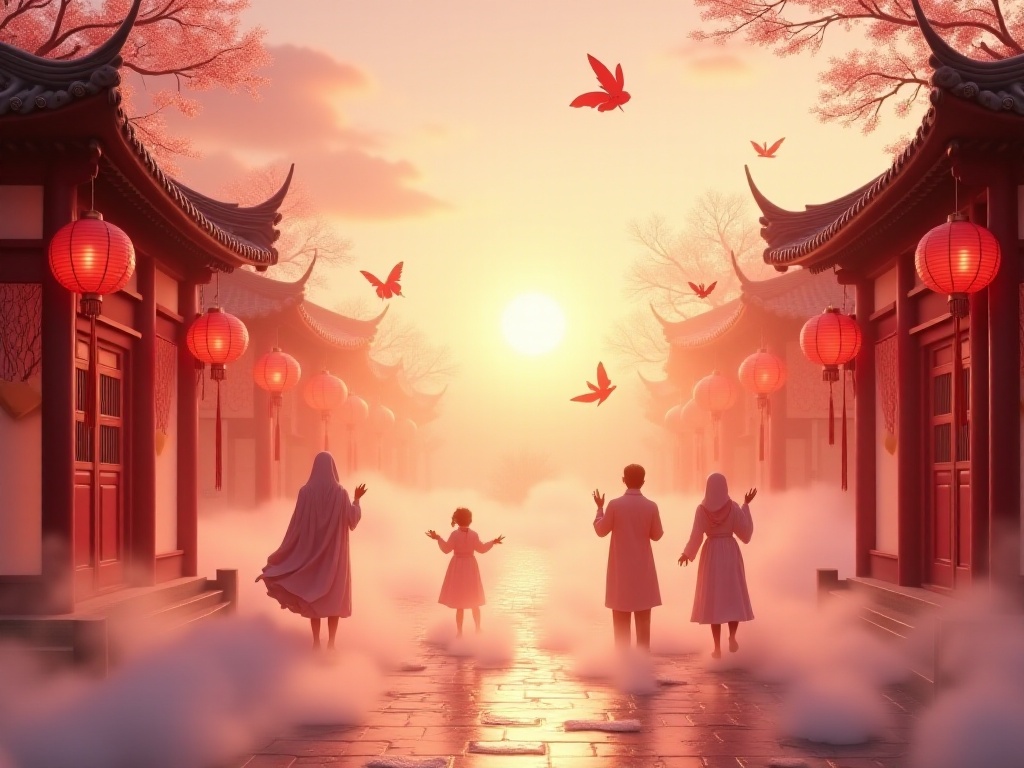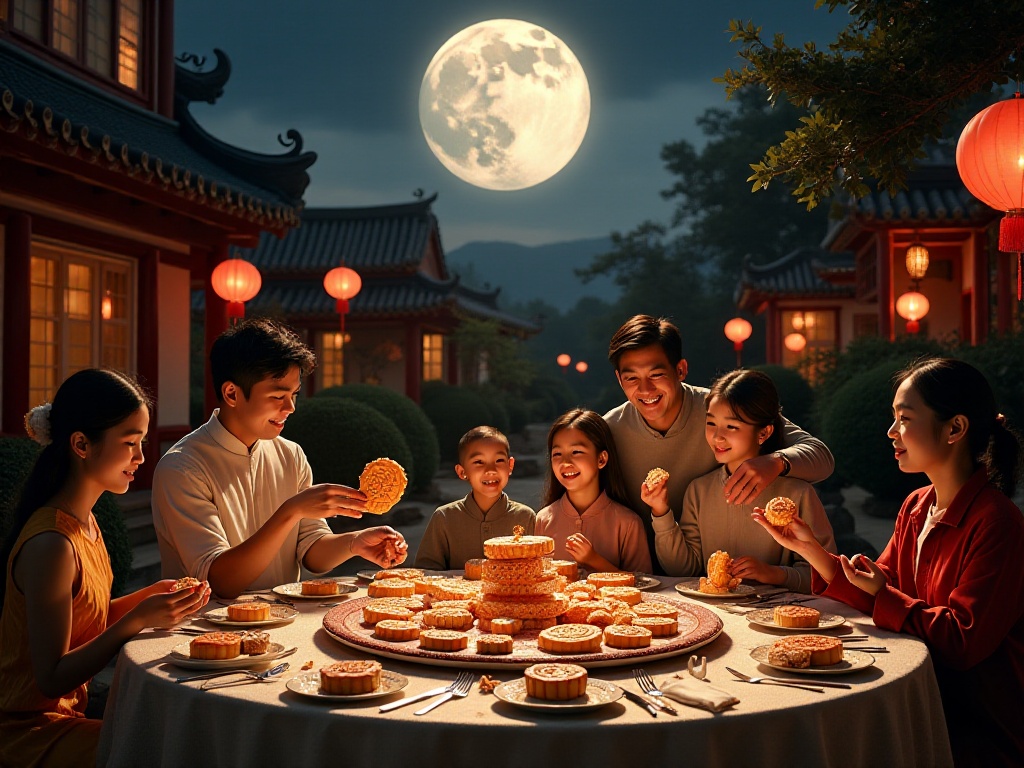Opening Thoughts
Recently, while looking through my diary from my study abroad years, I came across some observations and reflections that made me realize something fascinating. Our Chinese traditional festivals, passed down for thousands of years, may seem like simple customs but actually contain wisdom that makes life better.
To be honest, before living abroad, my understanding of these traditional festivals was quite superficial, seeing them as merely established conventions. But when I left my familiar environment and examined these traditions from an outsider's perspective, I realized how ingenious our ancestors were - the festival customs they created are practically textbooks of life wisdom.
The Wisdom of Spring Festival
Spring Festival is absolutely the top-tier among Chinese traditional festivals. When I first went abroad, my roommates were particularly interested in Chinese New Year. They were most curious about why we do thorough cleaning before the festival, and after hearing my explanation, they exclaimed at how wise it was!
In ancient agricultural society, the twelfth lunar month was a rare leisure period in the year. Doing thorough cleaning during this time was perfect! First, the farming break meant people had plenty of time for comprehensive cleaning. Second, the dry winter weather was ideal for ventilation and dusting. Most importantly, this timing allowed people to repair everything that needed fixing before the new year.
Interestingly, this tradition hasn't disappeared in modern society but has become increasingly popular. Many young people now also do thorough cleaning of their homes before Spring Festival. According to recent survey data, over 85% of Chinese families still maintain this tradition, and this percentage continues to rise annually.
The thorough cleaning isn't just about housekeeping; it's also an opportunity for home management. Through this comprehensive cleaning, we can discover which items need repair or replacement, which can be recycled, and which should be discarded. This periodic inventory is actually the concept of minimalism advocated in modern home management theories.
On a deeper level, Spring Festival cleaning also has an important psychological suggestion effect. By cleaning our physical environment, we're actually doing a mental cleanup as well. We clear away the worries and pressures of the old year to welcome the new year with a fresh outlook. Isn't this just like the ritual therapy advocated in modern psychology?

The Ingenuity of Lantern Festival
When it comes to the Lantern Festival, many people's first thought is eating tangyuan. But actually, the most ingenious design of the Lantern Festival is its custom of enjoying lanterns. This can be considered an incredibly wise social interaction method invented by the ancients.
Imagine the ancient scene: in an era without electric lights, large-scale social activities were difficult in cities at night. But on Lantern Festival night, the entire city would be decorated with lanterns, creating an excellent nighttime social space instantly.
Looking through historical records, you can see how strong the social aspect of the Lantern Festival was. For example, in Song Dynasty Kaifeng, the city became literally sleepless during the Lantern Festival. The emperor would specifically order the lifting of the curfew so people could enjoy viewing lanterns freely. The streets were filled not only with various lanterns but also with acrobatics, storytelling, and food stalls - it was practically an ancient version of a night cultural festival.
Moreover, the timing of the Lantern Festival was also well-thought-out. On the fifteenth day of the first lunar month, the weather starts to warm up but isn't too hot yet, making it perfect for outdoor activities. More importantly, this timing comes half a month after Spring Festival, when people have had enough family reunion time and are ready to socialize.
Modern research has found that good social activities are particularly important for both physical and mental health. Data shows that people who regularly participate in social activities can reduce their risk of depression by about 23%. Additionally, community-based collective activities more easily create a sense of belonging and security. Isn't this exactly what the Lantern Festival teaches us?

Wisdom Inheritance
During my years studying abroad, I often discussed Chinese traditional festivals with friends from around the world. To my surprise, they were incredibly impressed by the wisdom contained in Chinese traditional festivals.
Especially the Spring Festival reunion dinner culture, which they considered a genius invention. It provides a fixed, non-negotiable time for family gatherings. In modern society, many people often postpone or cancel family gatherings due to busy work schedules. But with the Spring Festival tradition, no matter how busy people are, they will put down their work and return home for reunion.
Research data shows that regular family gatherings can significantly increase family members' happiness by over 40%. This number isn't exaggerated because family gatherings aren't just about eating - more importantly, they promote emotional exchange between family members and enhance mutual understanding and support.
Carefully observing Chinese traditional festivals, you'll find they form a very complete annual social system. This system considers both internal family reunion needs and community interaction and visiting between friends and relatives.
For example, Spring Festival focuses on family reunion, allowing people to receive emotional support from family at the beginning of the new year. The Lantern Festival expands social circles to the community level, letting people meet new friends and expand their social networks. By Dragon Boat Festival, the focus shifts to visiting between friends and relatives, maintaining relationships through activities like giving zongzi. Mid-Autumn Festival brings the focus back to family reunion, allowing people to gather with family again after being busy for most of the year.
This cyclical social pattern, though seeming simple, contains profound sociological wisdom. It satisfies people's needs for different levels of social interaction while avoiding problems of excessive or insufficient socializing. In today's era of prevalent social media, this kind of real, rhythmic social interaction becomes even more valuable.

Modern Implications
By now, I believe you can feel the wisdom contained in traditional festival customs? Actually, this traditional wisdom can be completely transformed into practical tips for modern life.
Take Spring Festival cleaning for example - we can upgrade it into a more scientific home management system. For instance, we can change the frequency from annual to quarterly, which both avoids too much work at once and allows more timely discovery and resolution of household issues.
Practice has proven that this regular organization is indeed effective. Data shows that families who stick to regular house organization see an average 15% increase in work efficiency and 28% increase in overall happiness. This is because a clean and orderly living environment can reduce psychological burden and improve quality of life.
The social wisdom of the Lantern Festival is also particularly worth learning from for modern community building. Many communities are now trying to create neighborhood culture and organize various community activities, but the results are often not ideal. They could actually learn from the Lantern Festival experience and design activities to be more interesting and participatory.
Research shows that residents who participate in community activities can increase their sense of community belonging by about 35%. This data shows that good community activities can indeed promote neighborly relations and strengthen community cohesion. The key is finding appropriate activity forms and timing, just like the Lantern Festival.
Another example is the "gift-giving" culture in traditional festivals, which is also worth learning from for modern people. Giving zongzi during Dragon Boat Festival and mooncakes during Mid-Autumn Festival - this gift-giving custom may seem ordinary but is a good method for maintaining interpersonal relationships. Modern people can completely continue this tradition, just with more diverse and personalized gift forms.

Concluding Thoughts
After this analysis, I increasingly feel that Chinese traditional festival customs are truly crystallizations of wisdom. They aren't just simple cultural inheritance but a precious life guide left by our ancestors.
In this rapidly changing era, we don't need to completely copy traditional forms, but we must understand and inherit their wisdom. For example, the emphasis on family reunion, control of social rhythm, management of living space, etc. - these are all universal life wisdom.
Most importantly, these traditional festival customs remind us that life isn't just about efficiency and convenience, but should also have ritual sense and human warmth. While pursuing modernization, we should maintain reverence for and learning from traditional wisdom.
What other life wisdom contained in traditional festival customs do you think is worth learning from? Welcome to share your views and experiences in the comments. I believe through our exchange, we can discover more value of traditional wisdom in modern life.







